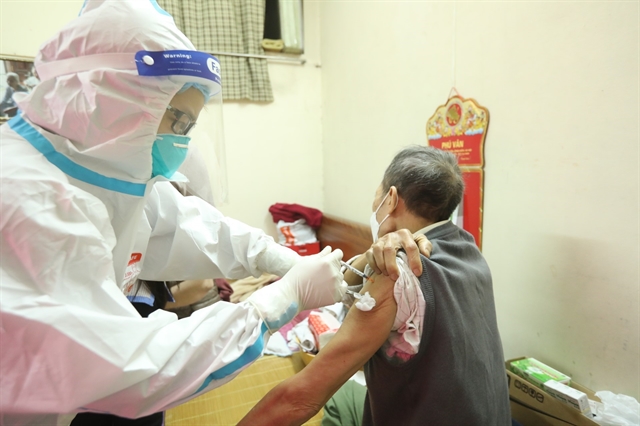 Society
Society


|
| A medical worker gives a COVID-19 injection to an elderly person at home in Cửa Đông Ward, Hoàn Kiếm District in Hà Nội. — VNA/VNS Photo Minh Quyết |
HÀ NỘI — Remote medical guides for COVID-19 patients treating at home help people feel more secure, learn how to take medicine and overcome symptoms to get well soon.
Peace of mind
Đỗ Thùy Dương, who lives in Bạch Đằng Ward, Hai Bà Trưng District in Hà Nội, felt worried seeing her family members coughing with high temperatures, so she prepared quick tests and took samples of all of her family.
When Dương’s grandfather and niece tested positive for COVID-19, all of her family fell into panic.
Dương immediately called Dr Nguyễn Trung Nghĩa of the Việt Nam-Cuba Hospital to ask for help. The doctor was part of the system “Doctors accompanying and supporting COVID-19 patients.”
“When the doctor answered my phone and advised me, I felt much more secure in my mind. He carefully gave me guidance about medical declarations, medicines, quarantine and giving care to patients,” she said.
Dương called Nghĩa every day to report the patients’ situations, day and night. Every time, she received a quick, helpful consultation from the doctor.
Since December 31, Dương’s family have fought against the pandemic, quarantined and self-treated at home. Luckily, all of the patients in the family had light symptoms.
“Now all of my family have recovered. We are waiting for test results to confirm,” said Dương.
Nguyễn Thị Thanh Tâm, lives in Hàng Bột Ward in Đống Đa District, discovered her 80-year-old father suffered from COVID-19. She also called Dr Nghĩa for help. After receiving the doctor’s instruction, Tâm prepared the necessary tools and followed his advice.
“My father is old and has many underlying diseases such as cardiovascular disease and high blood pressure so I was very worried. Although he had received two doses of vaccine, he still had a runny nose and was coughing. I was very lucky to have the doctor’s phone number and receive guidance from him,” she said.
With careful instruction and mental reassurance, Tâm’s father gradually overcame the disease and no one else in her family was infected.
“Having a doctor to consult every day helps us feel secure while treating COVID-19 at home,” she said.
Dr Nghĩa said: “When receiving the calls asking for help, I saw that the patients and their family were in panic, and did not know how to treat and quarantine properly to prevent transmission. Thus the first thing I had to do was calm them down.”
As for patients treating at home, close supervision was needed though the symptoms were light, he said.
When someone needs help Nghĩa is ready to send them guidance, enthusiastically guiding patients regardless of if it is day or night.
“Mental reassurance for patients is very important, affecting their recovery process. Especially the use of drugs, most people do not know much about common drugs so can use them wrongly. I used to be startled when a patient sent me online prescriptions with many types of drugs, including anticoagulants, anti-inflammatory and antibiotics. If they don’t have doctor's guidance, they just have medicines without understanding, and then consequences are dangerous," he said.
Reduce severe cases
Returning from the working trip to support COVID-19 control in the southern province of Tiền Giang, Tô Hoàng Dương immediately joined the system “Doctors accompanying patients,” and the hotline 1022.
Tô Hoàng Dương, deputy head of the Intensive Care Ward of the Việt Nam Soviet Friendship Hospital, wanted to help COVID-19 patients treating at home.
Taking advantage of every minute, every hour besides his main work at the hospital, Tô Hoàng Dương has almost no time to rest. Monitoring and consulting three patients treating at home, his phone and Zalo application continuously receive calls and messages from patients.
“Patients need to be monitored, advised to treat themselves reasonably and use drugs properly, especially children and the elderly with underlying diseases,” said Tô Hoàng Dương.
Tô Hoàng Dương's experience shows that right at the beginning of the disease there are no symptoms, and if the patients are well controlled with official advice from doctors, they can avoid unfortunate developments.
“For patients with mild or no symptoms, it is necessary to follow instructions and suitable meals. Patients with underlying diseases and the elderly should know how to control their underlying disease. Every stage that is closely supervised can reduce severe condition,” he said.
Tô Hoàng Dương feels tired but happy to accompany patients to recover from illness. Every day, when receiving a thank-you message from a patient who tested negative, Dương feels motivated to try to help more people.
With advice and remote companionship of doctors, many patients were able to safely receive treatment in the community. This also helped avoid overload at hospitals.
Doctors also recommend that home-treatment patients follow official information including instruction from the Ministry of Health, seek advice from medical staff, connect with hospitals, and use supportive networks such as hotline 1022. They should not use drugs on their own initiative. — VNS




